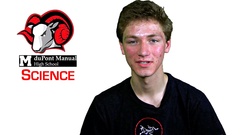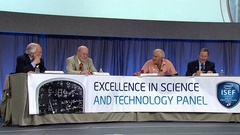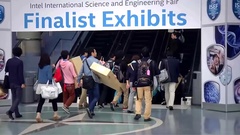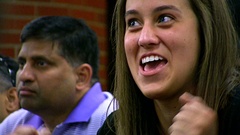Kentucky High School Launches "Science Where it Happens" to Advance American Exceptionalism at the 2015 Intel International Science and Engineering Fair (ISEF)
March 27, 2015 (PRLEAP.COM) Education News
March 27, 2015 - American exceptionalism was built on the backs of scientists and engineers supported by the most efficient capital markets and most effective venture capital system in the world. Traditionally, this means that private funds find the best science. Public money also supports the pursuit of science (e.g. NASA, Arpanet) and science education. Unfortunately, the public money to develop those scientists and engineers at the high school level is disappearing. And the will to emphasize science education at the federal level is weakening.At the local level, cities like Louisville, KY can't justify an investment in science education for high achievers because they don't have the STEM jobs that will bring those students back after college. So, what is the US doing to invest in the students with the best science and engineering potential, wherever they live?
DuPont Manual is an urban high school in Louisville, KY with an annual budget of less than $9,000 per student. The school has created a student culture that is producing an abundance of world class science and engineering students. At the 2014 Intel International Science and Engineering Fair (ISEF), DuPont sent 13 students and finished second in total awards only to The Harken School, a private high school in Silicon Valley with an annual budget of $58,000 per student.
The Board for the DuPont Manual Regional Science and Engineering Fair (DMRSEF) has launched a campaign aimed to help fund Louisville's brightest science and engineering students with the opportunity to compete at the international level. "Support Science Where it Happens" will pay for qualifying students to attend the 2015 Intel ISEF Fair in Pittsburgh, PA.
DuPont is producing science results far beyond the norms for similar high schools in other parts of the country. On average, an American public high school sends roughly one student to ISEF every 25 years. DuPont averages between ten and twelve students each year. Unfortunately, the public education system in Louisville never anticipated these kinds of results and never established a way to pay for them.
Due to budget cuts in the Kentucky public school system, local businesses are needed to support the many other pressing needs of an urban school district that ranks high nationally in poverty and homelessness. Without school district and corporate support, schools like DuPont simply can't afford to be exceptional.
This impressive performance got the attention of Louisville's Chief of Economic Growth and Innovation, Dr. Ted Smith. "How is a high school in Kentucky outperforming competitive high schools in states like New York, California, or Texas? Yes, DuPont is a selective high school, but that alone does not explain the performance of it's students at the national level." In 2014, Smith joined the board of DMRSEF to assist fundraising efforts and learn more about the culture that is driving DuPont's science results.
"Until such time as we find a local or national solution to this problem, we need to find a way to pay for the students who are achieving now, wherever they are." says Smith.
DMRSEF, which already pays the costs to produce a regional science fair for DuPont students, is now attempting to raise funding to give these deserving students the life changing opportunity to attend ISEF.
To get involved, make a donation, or contact: Mr. Skip Zwanzig at glenn.zwanzig@jefferson.kyschools.us




